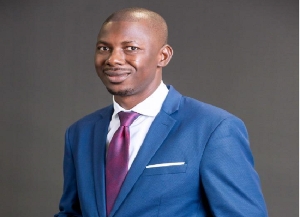- Home - News
- TWI News | TV
- Polls
- Year In Review
- News Archive
- Crime & Punishment
- Politics
- Regional
- Editorial
- Health
- Ghanaians Abroad
- Tabloid
- Africa
- Religion
- Election 2020
- Coronavirus
- News Videos | TV
- Photo Archives
- News Headlines
- Press Release
Opinions of Monday, 5 February 2018
Columnist: Shadrach Korsah
The resultant behaviour of Free SHS Policy, from a social psychological perspective
Social circumstances, situations, laws, actions, policies etc affect man’s mind to produce a particular behaviour. We are therefore referring to how ‘things’ from society are likely going to influence people to cultivate a particular mindset, which subsequently leads to the manifestation of some kind of behaviours and this exactly is the focus of Social Psychology.
Anything in society has an influence on the mind. Hence, this discussion focuses on the mindset and behaviours to be produced by the ‘Free Senior High School policy'. The interest is in the ‘course and effects’ of such a social action, as Max Weber puts it.
Although the free SHS policy has been hailed by many, including world leaders; whilst received some criticisms as well; however, its influence does not end there, it ends in the lives of the consumers of the policy (the people). The question therefore is what then are some of the behaviours likely to be produced by this social policy?
It is highly anticipated that the free SHS instills the spirit of Patriotism into most of the young individuals of our society. It has been said that, a ‘good society produces a good individual'.
Free SHS provides a new era in which individuals no longer see society as a habitation or a norm of life, rather a credible parent who cares about their development.
This ultimately leads to the development of strong emotional attachment and altruistic attitudes towards the things of society, and hence ready to sacrifice themselves for growth of society. The conscience of the products of a society that cares will absolutely not to be free, should they attempt to sin against society.
This is to say that, individuals from societies that do not care have dead conscience. Like Professor Durkheim puts it, 'society is the source of morality and personality'. If the society puts nothing good into the mind of the youngster, then he absolutely has an empty conscience, nothing about society is found in the mind of such individuals. This further creates ego centrism and gross apathy; and this I think, the free senior high school has the power to suppress.
Also, the free SHS has a high potency to reduce inferiority complex in young individuals. The feeling of inferiority in most cases, happens when individuals compare themselves to others and see they are not well provided for. Only few people are naturally created with the mental power to defeat such constraints.
The free SHS ensures that, greater part of the educational needs of every qualified student is catered for. The culture of economically less endowed students going to a less endowed schools would to be reduced, as it provides equal opportunity for all. Hopefulness for every child would also be revived.
Indeed, the policy has been welcomed by many. Like already said in other articles, the free SHS prevents single parenting and its associated financial burdens.
This helps to instill patriotism in the generations. But there are also some expected negative thoughts and behaviours as well, to result from this good policy. Some of these have been discussed below.
Some of the students and parents are very likely not to be serious about the academic work and productivity. Some of them are more likely to take school for enjoyment and entertainment.
This would be inspired on the premise that, after all, their burdens have been taken away from them and thus nothing to worry about. From practical life experiences, some level of difficult leads to, or challenges one to work hard to change such undesirable situations they go through.
Naturally, man’s mind is full of pleasure, the infliction of some pain brings the mind to normal. Some parents, unexpectedly but possibly, would suffer the same weakness to be less caring about their wards' education, because they do not suffer for it. If a parent personally pays for the child’s development, including education, then he/she monitors very well to ensure that what is invested produces good results. But the problem here is that, unintentional forgetfulness is likely to be formed by some parents, and subsequently will not care if the suffering of the state is going in vain.
The next resultant behavior that deserves consideration is from the Parent- child relationship. The question is who lose some level of expected recognition or allegiance; obviously, no one can serve two masters. But the question is who wins the heart of the adorable young individual and who suffers, as both society and the biological parents, to some extent are competitive suitors or bidders.
To a greater expectation, the child opts for the society, because he sees society as the one taking care for him/her. Some children will feel their parents are not caring, as they have relinquished their natural duties to another parent (society).
This discussion does not in any way intend to condemn or predict doom for the beneficial and prominent free Senior high school intervention, or neither am I involved in political communication. Rather, I am only giving advice on the human/behavioural aspect of the policy.
I have engaged in this analysis to expose some of the potential effects, to be well equipped to deal with them and more especially, the negative ones preempted. The mindsets and corresponding behaviours discussed, are really ‘bound to happen’: based on likelihoods.
Encouraging the good behaviours and preventing the wrong ones must come from dealing with the minds of all stakeholders of secondary education. The appropriate socialization and development of the young individual is a collective responsibility of all and sundry. This means that the state, parents and social institutions and all individuals must play their part in this collective action.
To me, the parents and the schools have greater responsibilities to play in this SHS policy, although the government pays the money: whether it works or not, the answer must come from, the parents and the schools. We must also be cautious not to use this good policy for a political glory.
The system around this policy must be created in such a way that, every stakeholder has a role to play, and plays it well for the success of the intervention. This ensures and promotes the sense of belongingness in all and not an achievement of a political party. At the end we all together can feel good.
SHADRACH KORSAH
BA. SOCIOLOGY, KNUST.
FORMER STUDENT, TUOBODOM SENIOR HIGH SCHOOL.











